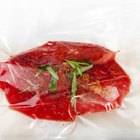foxjon/iStock/GettyImages
Until the coming of refrigeration, smoking meat was a major food preservation method. After meat was smoked, it was kept in smokehouses set in cooler locations around homes and farms. Today smoking meat has become a method of food preparation rather than preservation, but the erroneous idea that smoked meat can last beyond safe periods in refrigeration lingers. The reality is that smoked meat has a storage life much the same as meat prepared any other way.
A Few Days' Keeping
Smoked meat can be kept three to four days in a refrigerator after being cooked. Properly wrapped, smoked meat will last two to three months in a freezer. In neither case should smoked meat be kept or used beyond these recommended times because of the likelihood that the meat will be unsafe for humans or pets to eat.
Safety Starts with Cooking
Good food safety involving smoked meat actually begins with the cooking process itself. Smoking is a method in which meats, poultry, fish and even vegetables are slowly cooked at lower temperatures by indirect heat, namely the smoke and heat that arise from burning charcoal or wood chips in an enclosed container. A standard outdoor grill with a cover or a special covered oven called a smoker is used for this purpose. Smokers shouldn't be made out of drums or other containers that have held other substances previously because of the danger of contamination.
Food Safety in Four Steps
The recommended food-safe process for smoking meat involves four steps: clean, separate, cook and chill. In the clean step, the cook should wash his hands and working surfaces often. The separate step refers to keeping raw meats separated from other foods to avoid cross-contamination. The third step requires cooking to proper temperatures, which is a minimum internal temperature of 145 degrees Fahrenheit as measured by a quality meat thermometer for beef, veal or pork. Poultry should be cooked to 165 F. The final step, chill, requires that leftover smoked meat be refrigerated within two hours of serving to slow the growth of bacteria that cause food poisoning.
Refrigeration Is Key
Refrigeration is key to keeping smoked meat safe for consumption. Bacteria grow in temperatures from 40 to 140 F, a range that food safety experts call "the danger zone." A refrigerator should be set to 40 F or below to protect all foods, but even chilling won't keep smoked meat edible forever. Neither marinating, cooking, adding sauce or the smoking process itself will give smoked meats any more longevity or protection from bacteria than today's food safety standards specify.
Related Articles

How to Smoke Sausage in a Meat Smoker

Can You Cook Meat Gone Bad?

How to Cook Barbecue Deer in the Slow ...

Do You Thaw Hamburger Patties Before ...

How to Pickle Brine Sausage

The History of Smoking Meat

Potluck Main Dishes That Do Not Need ...

How Long Can Smoked Meat Last Without ...

What Does Spoiled Meat Smell Like When ...

How to Reheat Beef Ribs

How to Cook Portuguese Steak
Can You Use Stew Meat That Has Been ...

How Long Can Meat Stay out of the ...

The Advantages of Pickling Foods

Rules for Thawing and Refreezing Meat

How to Defrost a Chicken in a ...

What Does It Mean When Hamburger Smells ...
What Cut of Meat Do You Use to Make ...

How to Soak Deer Meat in Baking Soda

How to Know if Bacon Has Gone Bad
References
Writer Bio
Cynthia B. Astle is a longtime journalist who has written on practically every topic of human interest for newspapers such as the "United Methodist Reporter," magazines including "Response," "Arts Ministry" and the "Progressive Christian" and websites such as Darkwood Brew and United Methodist Insight. She was also a food editor and restaurant reviewer for the "Clearwater Sun."